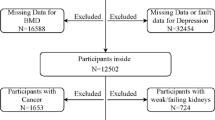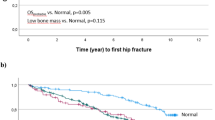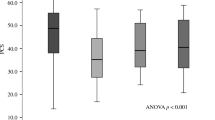Abstract
Summary
In this prospective cohort study, depressive symptoms were associated with higher rates of bone loss in older men. Poorer performance on physical function tests partly explained the association between depressive symptoms and bone loss, suggesting that efforts to increase exercise and improve physical performance in depressed men may be beneficial.
Introduction
The aim of this study was to ascertain whether depressive symptoms are associated with increased rates of bone loss at the hip in older men.
Methods
A population-based prospective cohort study of 2,464 community-dwelling men, aged 68 and older, enrolled in the Osteoporosis in Men Sleep Ancillary Study had depressive symptoms assessed by the Geriatric Depression Scale (GDS). Subjects were categorized as depressed if GDS ≥6 at the initial examination. Bone mineral density (BMD) at the hip was measured using dual-energy X-ray absorptiometry at the initial and follow-up examination (average 3.4 years between exams). Use of antidepressant medications was assessed by interview and verified from medication containers at the two examinations. A computerized dictionary was used to categorize type of medication.
Results
In a base model adjusted for age, race/ethnicity, and clinic site, the mean total hip BMD decreased 0.70 %/year in 136 men with a GDS score of ≥6 compared to 0.39 %/year in 2,328 men with a GDS score of <6 (p = 0.001). Walking speed and timed chair stand partly explained the association between depressive symptoms and rates of bone loss.
Conclusion
Depression, as defined by a score of 6 or greater on the Geriatric Depression Scale, is associated with an increased rate of bone loss at the hip in this cohort of older men. Adjustment for walking speed and timed chair stand attenuated the strength of the association, suggesting that differences in physical functioning do partially explain the observed association.

Similar content being viewed by others
References
Sogaard AJ, Joakimsen RM, Tverdal A, Fonnebo V, Magnus JH, Berntsen GK (2005) Long-term mental distress, bone mineral density and non-vertebral fractures. The Tromso study. Osteoporos Int 16:887–897
Whooley MA, Kip KE, Cauley JA, Ensrud KE, Nevitt MC, Browner WS (1999) Depression, falls, and risk of fracture in older women. Study of Osteoporotic Fractures Research Group. Arch Intern Med 159:484–490
Wu Q, Liu J, Gallegos-Orozco JF, Hentz JG (2010) Depression, fracture risk, and bone loss: a meta-analysis of cohort studies. Osteoporos Int 21:1627–1635
Diem SJ, Blackwell TL, Stone KL, Yaffe K, Cauley JA, Whooley MA, Ensrud KE (2007) Depressive symptoms and rates of bone loss at the hip in older women. J Am Geriatr Soc 55:824–831
Reginster JY, Deroisy R, Paul I, Hansenne M, Ansseau M (1999) Depressive vulnerability is not an independent risk factor for osteoporosis in postmenopausal women. Maturitas 33:133–137
Robbins J, Hirsch C, Whitmer R, Cauley J, Harris T (2001) The association of bone mineral density and depression in an older population. J Am Geriatr Soc 49:732–736
Spangler L, Scholes D, Brunner RL, Robbins J, Reed SD, Newton KM, Melville JL, Lacroix AZ (2008) Depressive symptoms, bone loss, and fractures in postmenopausal women. J Gen Intern Med 23:567–574
Whitson HE, Sanders L, Pieper CF, Gold DT, Papaioannou A, Richards JB, Adachi JD, Lyles KW (2008) Depressive symptomatology and fracture risk in community-dwelling older men and women. Aging Clin Exp Res 20:585–592
Lewis CE, Ewing SK, Taylor BC, Shikany JM, Fink HA, Ensrud KE, Barrett-Connor E, Cummings SR, Orwoll E (2007) Predictors of non-spine fracture in elderly men: the MrOS study. J Bone Miner Res 22:211–219
Blank JB, Cawthon PM, Carrion-Petersen ML, Harper L, Johnson JP, Mitson E, Delay RR (2005) Overview of recruitment for the osteoporotic fractures in men study (MrOS). Contemp Clin Trials 26:557–568
Orwoll E, Blank JB, Barrett-Connor E, Cauley J, Cummings S, Ensrud K, Lewis C, Cawthon PM, Marcus R, Marshall LM, McGowan J, Phipps K, Sherman S, Stefanick ML, Stone K (2005) Design and baseline characteristics of the osteoporotic fractures in men (MrOS) study—a large observational study of the determinants of fracture in older men. Contemp Clin Trials 26:569–585
Sheikh JI, Yesavage JA (1986) Geriatric depression scale (GDS): recent evidence and development of a shorter version. Clin Gerontol 5:165–173
Gerety MB, Williams JW Jr, Mulrow CD, Cornell JE, Kadri AA, Rosenberg J, Chiodo LK, Long M (1994) Performance of case-finding tools for depression in the nursing home: influence of clinical and functional characteristics and selection of optimal threshold scores. J Am Geriatr Soc 42:1103–1109
Pahor M, Chrischilles EA, Guralnik JM, Brown SL, Wallace RB, Carbonin P (1994) Drug data coding and analysis in epidemiologic studies. Eur J Epidemiol 10:405–411
Washburn RA, Ficker JL (1999) Physical Activity Scale for the Elderly (PASE): the relationship with activity measured by a portable accelerometer. J Sports Med Phys Fitness 39:336–340
Ensrud KE, Nevitt MC, Yunis C, Cauley JA, Seeley DG, Fox KM, Cummings SR (1994) Correlates of impaired function in older women. J Am Geriatr Soc 42:481–489
Fitti JE, Kovar MG (1987) The supplement on aging to the 1984 National Health Interview Survey. Vital Health Stat 1:1–115
Pincus T, Summey JA, Soraci SA Jr, Wallston KA, Hummon NP (1983) Assessment of patient satisfaction in activities of daily living using a modified Stanford Health Assessment questionnaire. Arthritis Rheum 26:1346–1353
Teng EL, Chui HC (1987) The modified mini-mental State (3MS) examination. J Clin Psychiatr 48:314–318
Lohman TG, Roche AF, Martorell R (1988) Anthropometric standardization reference manual. Human Kinetics, Champaign
Ensrud KE, Walczak TS, Blackwell T, Ensrud ER, Bowman PJ, Stone KL (2004) Antiepileptic drug use increases rates of bone loss in older women: a prospective study. Neurology 62:2051–2057
Jacka FN, Pasco JA, Henry MJ, Kotowicz MA, Dodd S, Nicholson GC, Berk M (2005) Depression and bone mineral density in a community sample of perimenopausal women: Geelong Osteoporosis Study. Menopause 12:88–91
Michelson D, Stratakis C, Hill L, Reynolds J, Galliven E, Chrousos G, Gold P (1996) Bone mineral density in women with depression. N Engl J Med 335:1176–1181
Schweiger U, Deuschle M, Korner A, Lammers CH, Schmider J, Gotthardt U, Holsboer F, Heuser I (1994) Low lumbar bone mineral density in patients with major depression. Am J Psychiatry 151:1691–1693
Wong SY, Lau EM, Lynn H, Leung PC, Woo J, Cummings SR, Orwoll E (2005) Depression and bone mineral density: is there a relationship in elderly Asian men? Results from Mr. Os (Hong Kong). Osteoporos Int 16:610–615
Yazici KM, Akinci A, Sutcu A, Ozcakar L (2003) Bone mineral density in premenopausal women with major depressive disorder. Psychiatr Res 117:271–275
Whooley MA, Cauley JA, Zmuda JM, Haney EM, Glynn NW (2004) Depressive symptoms and bone mineral density in older men. J Geriatr Psychiatr Neurol 17:88–92
Schweiger U, Weber B, Deuschle M, Heuser I (2000) Lumbar bone mineral density in patients with major depression: evidence of increased bone loss at follow-up. Am J Psychiatry 157:118–120
Milliken LA, Wilhelmy J, Martin CJ, Finkenthal N, Cussler E, Metcalfe L, Guido TA, Going SB, Lohman TG (2006) Depressive symptoms and changes in body weight exert independent and site-specific effects on bone in postmenopausal women exercising for 1 year. J Gerontol A Biol Sci Med Sci 61:488–494
Mussolino ME (2005) Depression and hip fracture risk: the NHANES I epidemiologic follow-up study. Public Health Rep 120:71–75
Bauer DC, Browner WS, Cauley JA, Orwoll ES, Scott JC, Black DM, Tao JL, Cummings SR (1993) Factors associated with appendicular bone mass in older women. The Study of Osteoporotic Fractures Research Group. Ann Intern Med 118:657–665
Chen JS, Cameron ID, Cumming RG, Lord SR, March LM, Sambrook PN, Simpson JM, Seibel MJ (2006) Effect of age-related chronic immobility on markers of bone turnover. J Bone Miner Res 21:324–331
Ensrud KE, Blackwell T, Mangione CM, Bowman PJ, Bauer DC, Schwartz A, Hanlon JT, Nevitt MC, Whooley MA (2003) Central nervous system active medications and risk for fractures in older women. Arch Intern Med 163:949–957
Fitzpatrick LA (2002) Secondary causes of osteoporosis. Mayo Clin Proc 77:453–468
Diem SJ, Blackwell TL, Stone KL, Yaffe K, Haney EM, Bliziotes MM, Ensrud KE (2007) Use of antidepressants and rates of hip bone loss in older women: the study of osteoporotic fractures. Arch Intern Med 167:1240–1245
Warden SJ, Haney EM (2008) Skeletal effects of serotonin (5-hydroxytryptamine) transporter inhibition: evidence from in vitro and animal-based studies. J Musculoskelet Neuronal Interact 8:121–132
Warden SJ, Robling AG, Haney EM, Turner CH, Bliziotes MM (2010) The emerging role of serotonin (5-hydroxytryptamine) in the skeleton and its mediation of the skeletal effects of low-density lipoprotein receptor-related protein 5 (LRP5). Bone 46:4–12
Heuser I (1998) Anna-Monika-Prize paper. The hypothalamic–pituitary–adrenal system in depression. Pharmacopsychiatry 31:10–13
Jilka RL, Hangoc G, Girasole G, Passeri G, Williams DC, Abrams JS, Boyce B, Broxmeyer H, Manolagas SC (1992) Increased osteoclast development after estrogen loss: mediation by interleukin-6. Science 257:88–91
Nanes MS (2003) Tumor necrosis factor-alpha: molecular and cellular mechanisms in skeletal pathology. Gene 321:1–15
Dentino AN, Pieper CF, Rao MK, Currie MS, Harris T, Blazer DG, Cohen HJ (1999) Association of interleukin-6 and other biologic variables with depression in older people living in the community. J Am Geriatr Soc 47:6–11
Kiecolt-Glaser JK, Glaser R (2002) Depression and immune function: central pathways to morbidity and mortality. J Psychosom Res 53:873–876
Maes M (1999) Major depression and activation of the inflammatory response system. Adv Exp Med Biol 461:25–46
Pahor M, Blair SN, Espeland M, Fielding R, Gill TM, Guralnik JM, Hadley EC, King AC, Kritchevsky SB, Maraldi C, Miller ME, Newman AB, Rejeski WJ, Romashkan S, Studenski S (2006) Effects of a physical activity intervention on measures of physical performance: results of the lifestyle interventions and independence for elders pilot (LIFE-P) study. J Gerontol A Biol Sci Med Sci 61:1157–1165
Rejeski WJ, Marsh AP, Chmelo E, Prescott AJ, Dobrosielski M, Walkup MP, Espeland M, Miller ME, Kritchevsky S (2009) The lifestyle interventions and independence for elders pilot (LIFE-P): 2-year follow-up. J Gerontol A Biol Sci Med Sci 64:462–467
Mead GE, Morley W, Campbell P, Greig CA, McMurdo M, Lawlor DA. Exercise for depression. Cochrane Database Syst Rev 2009; CD004366
Acknowledgments
The Osteoporotic Fractures in Men (MrOS) study is supported by the National Institutes of Health funding. The following institutes provide support: the National Institute of Arthritis and Musculoskeletal and Skin Diseases (NIAMS), the National Institute on Aging, the National Center for Research Resources, and NIH Roadmap for Medical Research under the following grant numbers: U01 AR45580, U01 AR45614, U01 AR45632, U01 AR45647, U01 AR45654, U01 AR45583, U01 AG18197, U01-AG027810, and UL1 RR024140. Dr. Haney is supported by a career development award from the NIAMS: K23 AR051926.
Conflicts of interest
None
Author information
Authors and Affiliations
Consortia
Corresponding author
Rights and permissions
About this article
Cite this article
Diem, S.J., Harrison, S.L., Haney, E. et al. Depressive symptoms and rates of bone loss at the hip in older men. Osteoporos Int 24, 111–119 (2013). https://doi.org/10.1007/s00198-012-1975-0
Received:
Accepted:
Published:
Issue Date:
DOI: https://doi.org/10.1007/s00198-012-1975-0




